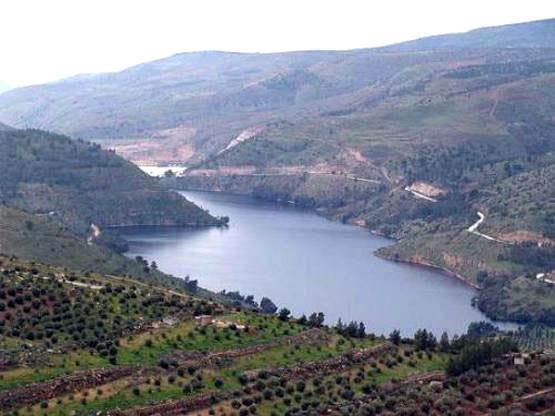By JT – Jul 25,2020

In this undated photo, an aeriel view of the King Talal Dam in Jerash, some 50km north of Amman, can be seen (Photo courtesy of the Ministry of Water and Irrigation)
AMMAN — The Water Ministry has plans to intensify remote aerial surveillance of water resources in coordination with the King Abdullah II Design and Development Bureau (KADDB), Minister of Water and Irrigation Raed Abul Saud said on Friday.
Abul Saud, during a tour of violation spots in the area between Qatraneh and the main pump station near Mudawwara, said that the ministry had detected two violations over the past two days, the Jordan News Agency, Petra, reported.
He also noted that any attempts to tamper with the strategic Disi pipeline, which secures about 50 per cent of drinking water all over the Kingdom, “will not be permitted by any means”.
Repairing damages to water resources, resulting from attacks, incurs the ministry huge costs and causes water supply shortages in many areas, Abul Saud added.
Abul Saud also had a firsthand look at the efforts exerted by KADDB and the remote aerial surveillance conducted in coordination with the bureau, which had made a “remarkable difference” in a short time.
He stressed that the Water Ministry will expand its monitoring through remote surveillance in coordination with KADDB.
The minister pointed out that attacks on water pipelines and resources are considered as “flagrant violation” of citizens’ rights to access water.
Abul Saud called on the public to cooperate and to help prevent such attacks.
Meanwhile, during a meeting with the concerned authorities responsible for implementing the expansion of Aqaba’s new water purification plant, the minister highlighted the importance of finishing all the technical and engineering works before the end of the year.
He also said that the ministry, in cooperation with the Aqaba Water Company, is working to enhance the level of sanitation services in Aqaba.
Director General of Aqaba Water Company Khalid Obaideen said that the project of expansion and developing the purification plant of north Aqaba, which consists of an additional plant for wastewater purification with a capacity of 28,000 cubic metres per day, has already started, expecting the plant to start operating by the end of 2020.
The existing mechanic plant with a capacity of 12,000 cubic metres will be renovated and operated with the new plant to produce treated water of high quality to supply irrigation, tourism and investment projects and the industrial sector in Aqaba, Obaideen added.
He also stated that the directorate had commenced the restoration of old ponds into strategic reservoirs that stores excess treated water in emergency conditions. The restoration project is expected to conclude by the first-quarter of next year, according to the official.
